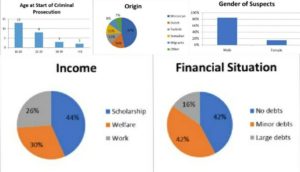
The document “Dutch Suspects of Terrorist Activity: A Study of Their Biographical Backgrounds Based on Primary Sources”, published in September 2017 on the Journal for Deradicalization gives a structured overview of the biographical backgrounds of Dutch suspected terrorists. Authored by Maarten van Leyenhorst and Ada Andreas, the study fits into the debate about risk management and supervision of terrorist offences.
Based on pre-sentence reports of suspected or prosecuted people for being related to Salafi-Jihadi terrorism in Netherlands, experts discovered that 42% of the twenty six analyzed suspects had prior criminal convictions, and 73% of them had convictions involving violence, like burglaries and assaults. All of them denied any involvement in illegal activities and claimed that they were being prosecuted due to their Islamic beliefs.
According to the study, most suspects had identity problems or existential questions. Thereby, researchers believe the suspects started looking for explanations, and ended up having contact with radical ideologies. The analysis confirms that the internet has an important role on the process of Dutch individuals radicalization as many of the suspects had some kind of contact with radical ideologies available on the internet.
Researchers presented some criminogenic factors, after analysing each of the twenty six cases. Some of them are:
- The number of younger suspects increased, based on prior cases and according to probation officers from DPS (Dutch probation service);
- Females represent only 15% of the suspects, but fulfill very specific roles within the Salafi-Jihadi groups. Radicalized women usually collect money for the family of those who have been arrested or are in Syria and serve as mediators between male suspects that can’t communicate with each other;
- 46% of the suspects are second-generation immigrants from Moroccan parents;
- 54% of the twenty six suspects were raised in large families with six or more siblings and 46% had children;
- 54% of them lived with their parents before being arrested or departing to Syria;
- 78% of the suspects had an official income and 57% had debts. But the economic situation of many of them deteriorated some time before they pledged allegiance to extremist groups;
- 26% of the suspects had no work experience at all;
- 15% of them were diagnosed with a DMS-IV disorder, among them ADHD, borderline personality, PTSS and psychotic disorder.
Source: Dutch Suspects of Terrorist Activity: A Study of Their Biographical Backgrounds Based on Primary Sources.
Leyenhorst and Andreas finish the report giving recommendations to future researchers. For both of them it is extremely important to understand the reason why the number of younger suspects of terrorism is increasing and individuals with a prosperous career choose to support terrorist groups. According to the authors, further studies may help people learn more about the the motivations that lead to radicalization.
The full article can be accessed here: http://journals.sfu.ca/jd/index.php/jd/article/download/119/99
By Roanna Azevedo





